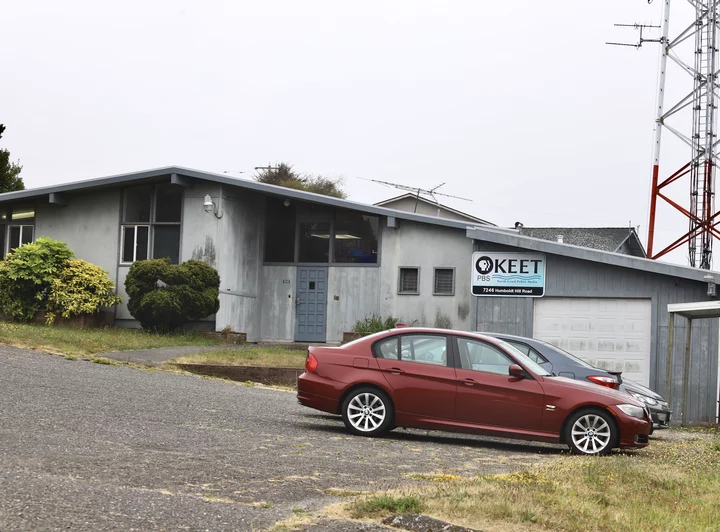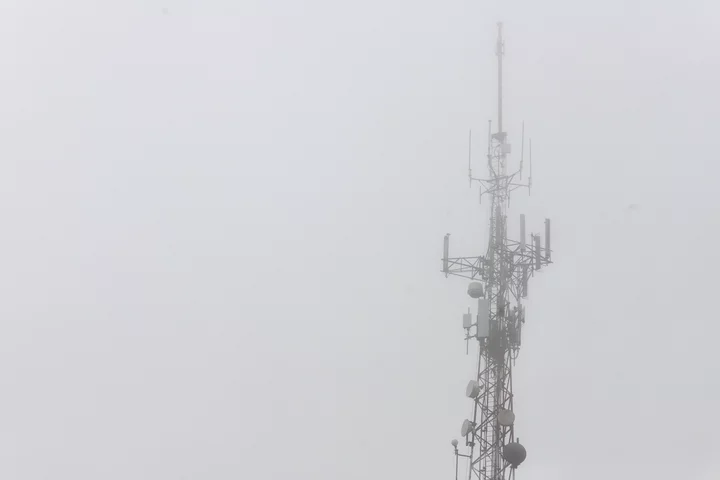KEET-TV’s studio is located at the top of Humboldt Hill. | Photo by Andrew Goff.
###
KEET-TV is in serious trouble, as are many other PBS member stations across the country, especially those in tribal and rural communities, following last night’s Congressional approval of a White House request to strip $1.1 billion in funding from the Corporation for Public Broadcasting (CPB).
“It’s just gone,” KEET General Manager David Gordon said in a phone interview this morning. CPB funds represent about 45 percent of the station’s operating budget, and those funds typically get distributed twice per year — the first round arriving in April and the second coming in late October or early November. Not this year, though. And likely never again. “It’s just gone,” he repeated. “It’s not there.”
A side note: KEET-TV has been off the air for the past week and a half or so due to equipment issues, which staff are working to repair.
Gordon said he hopes to get a better understanding of how these drastic funding cuts will impact KEET next Wednesday when he meets with other PBS station managers. They’re hoping to hear from executives of the 56-year-old public broadcaster about the network’s plans moving forward, including its expectations for membership dues from local stations.
KEET received $862,900 from the Corporation for Public Broadcasting in Fiscal Year 2024, the most recent data available.
Regardless of the details, though, with nearly half of KEET’s funding now eliminated, Gordon expects the impacts to permeate throughout the station’s operations, possibly even jeopardizing its existence in any recognizable form.
“Bottom line: if the dues structure is to stay the same … it’s doubtful that there will be much if any PBS programming on our air,” Gordon said.
How much of the station’s current programming comes from PBS?
“Almost all of it,” he replied. That includes landmark children’s programming such as “Sesame Street” as well as news, educational and entertainment shows such as “PBS NewsHour,” “Frontline,” “NOVA,” “Antiques Roadshow” and “American Experience.”
“There are some local programs we do, and we do have some programs from other sources. But it’s a small portion of our weekly and yearly schedule,” Gordon said. The station’s PBS-sourced programming spans across several channels, including KEET Kids, a Create channel, a World channel and FNX — First Nations Experience, which is devoted exclusively to Native American and World Indigenous content.
In an interview with the Washington Post earlier this week, PBS President Paula Kerger said she expects rural stations to get hit the hardest by the elimination of funding.
“[I]t’s hard for me to imagine that there’s a long-term path there,” Kerger said. While PBS will survive in some form, she expects this move by Congress and the White House to simply eliminate a lot of PBS stations across the country.
“If you lose a local newspaper in a small community, someone can come in at another point and start up another local newspaper,” Kerger said. “But once broadcast licenses are gone, they’re gone. I can imagine they would be auctioned off for whatever purpose and you won’t have a local [PBS] television station again in a community.”
Gordon said KEET could well be one of the stations lost.
“I think there absolutely is an existential threat, because although there are alternative programing sources [from which] we could potentially put a non-commercial education schedule together and air it, it’s not going to be PBS,” he said. A financial cut this deep will impact not only programming but also day-to-day operations. Expenses include payroll for the station’s seven employees and bills necessary to keep the transmitters running and the power on.
Gordon reiterated that he needs to consult with PBS executives and other station managers to get a better idea of what’s next, but he thinks those with the most at stake in the community are the local kids who have no other options for quality early education programs, shows that help teach children how to read and write, practice good manners — “all these things that PBS programming has taught generations of kids,” Gordon said. “That’s the biggest impact. It would not be here.”
The funding cuts will also impact public radio stations. The Outpost left voicemails and sent emails seeking comment from both KMUD and KHSU but did not hear back before publication time. Nearly 25 percent of KMUD’s operating budget comes from the Corporation for Public Broadcasting, the station’s manager told reporter Daniel Mintz earlier this year.
KHSU is currently managed by CSU Sacramento NPR affiliate CapRadio, though operations are scheduled to return to Cal Poly Humboldt by the end of this year. A spokesperson for the university directed questions about the impact of funding cuts on KHSU to CapRadio’s chief marketing and revenue officer, who has not yet responded to an emailed list of questions.
[UPDATE, 3:13 p.m.: That executive, Chris Bruno, tells the Outpost via phone that the CPB funding cuts will not have a direct impact on KHSU. The station, under CapRadio’s management, has been operating independent of CPB funding for the past two fiscal years. While the station runs programming from National Public Radio, the bulk of funding for NPR comes from business and corporate sponsors, Bruno said.]
Earlier today, Gordon posted the following statement on KEET-TV’s Facebook page earlier today:
Dear Friends,
I’m writing to you today not just as KEET’s Executive Director, but as your neighbor on the Redwood Coast.
Congress has now passed a bill eliminating all federal funding for public broadcasting—threatening the foundation on which stations like KEET depend. At this moment, we are in urgent discussions with PBS and our national partners, working to understand whether they will help us continue to bring vital content to our community. Until we know more, we cannot say exactly what programming will be affected.
What we do know is this:
We will be forced to make painful cuts to both staff and programming in the days ahead. These decisions are heartbreaking, but our goal is to do everything possible to keep KEET serving the Redwood Coast.
Your support—now and in the future—will make all the difference as we fight for the station’s survival.We promise to keep you informed as the picture becomes clearer. In the meantime, please know how deeply grateful we are for your belief in local public media.
With resolve and appreciation,
David Gordon
Executive Director
KEET’s studio antenna reaches into Humboldt’s coastal fog. | Photo by Andrew Goff.
NOTE: This story has been updated to include a response from Chris Bruno and to add financial information about CPB grants.


CLICK TO MANAGE